情态动词表推测用法总结及专项练习
情态动词表推测的讲解及练习题
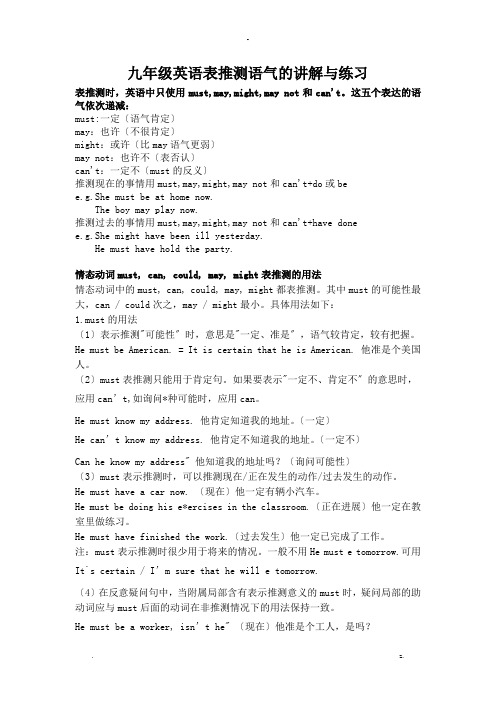
九年级英语表推测语气的讲解与练习表推测时,英语中只使用must,may,might,may not和can't。
这五个表达的语气依次递减:must:一定〔语气肯定〕may:也许〔不很肯定〕might:或许〔比may语气更弱〕may not:也许不〔表否认〕can't:一定不〔must的反义〕推测现在的事情用must,may,might,may not和can't+do或bee.g.She must be at home now.The boy may play now.推测过去的事情用must,may,might,may not和can't+have donee.g.She might have been ill yesterday.He must have hold the party.情态动词must, can, could, may, might表推测的用法情态动词中的must, can, could, may, might都表推测。
其中must的可能性最大,can / could次之,may / might最小。
具体用法如下:1.must的用法〔1〕表示推测"可能性〞时,意思是"一定、准是〞,语气较肯定,较有把握。
He must be American. = It is certain that he is American. 他准是个美国人。
〔2〕must表推测只能用于肯定句。
如果要表示"一定不、肯定不〞的意思时,应用can’t,如询问*种可能时,应用can。
He must know my address. 他肯定知道我的地址。
〔一定〕He can’t know my address. 他肯定不知道我的地址。
〔一定不〕Can he know my address" 他知道我的地址吗?〔询问可能性〕〔3〕must表示推测时,可以推测现在/正在发生的动作/过去发生的动作。
情态动词表推测用法总结和专项练习
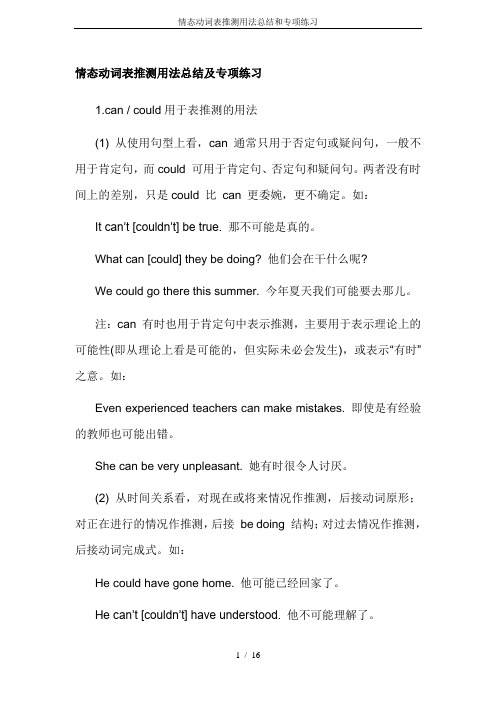
情态动词表推测用法总结及专项练习1.can / could用于表推测的用法(1) 从使用句型上看,can 通常只用于否定句或疑问句,一般不用于肯定句,而could 可用于肯定句、否定句和疑问句。
两者没有时间上的差别,只是could 比can 更委婉,更不确定。
如:It can’t [couldn’t] be true. 那不可能是真的。
What can [could] they be doing? 他们会在干什么呢?We could go there this summer. 今年夏天我们可能要去那儿。
注:can 有时也用于肯定句中表示推测,主要用于表示理论上的可能性(即从理论上看是可能的,但实际未必会发生),或表示“有时”之意。
如:Even experienced teachers can make mistakes. 即使是有经验的教师也可能出错。
She can be very unpleasant. 她有时很令人讨厌。
(2) 从时间关系看,对现在或将来情况作推测,后接动词原形;对正在进行的情况作推测,后接be doing 结构;对过去情况作推测,后接动词完成式。
如:He could have gone home. 他可能已经回家了。
He can’t [couldn’t] have understood. 他不可能理解了。
Why does he know this? Can [Could] someone have told him about it? 他怎么知道? 会是哪个人告诉他了吗?(3) “could+完成式”除表示对过去的推测外,还有以下重要用法:①表示过去没有实现的可能性,常译为“本来可以”。
如:I could have lent you the money.Why didn’t you ask me? 我本来可以借这笔钱给你的。
你为什么不向我提出?②用来委婉地责备某人过去应该做某事而没有去做,常译为“本来应该”。
情态动词表推测的讲解及练习题

九年级英语表推断语气的解说与练习表推断时,英语中只使用must,may,might,maynot和 can't。
这五个表达的语气挨次递减:神态动词 must,can,could,may,might表推断的用法神态动词中的 must,can,could,may,might都表推断。
此中 must 的可能性最大, can/could次之,may/might 最小。
详细用法以下:1.must的用法(1)表示推断“可能性”时,意思是“必定、准是”,语气较必定,较有掌握。
HemustbeAmerican.=ItiscertainthatheisAmerican他.准是个美国人。
(2)must 表推断只好用于必定句。
假如要表示“必定不、必定不”的意思时,应用 can’t,如咨询某种可能时,应用 can。
Hemustknowmyaddress他.必定知道我的地点。
(必定)Hecan’ tknowmyaddress他.必定不知道我的地点。
(必定不)Canheknowmyaddress?他知道我的地点吗?(咨询可能性)(3) must表示推断时,能够推断此刻/正在发生的动作 /过去发生的动作。
Hemusthaveacarnow(.此刻)他必定有辆小汽车。
Hemustbedoinghisexercisesintheclassroom(正.在进行)他必定在教室里做练习。
Hemusthavefinishedthework(.过去发生)他必定已达成了工作。
注: must表示推断时极少用于未来的状况。
一般不用Hemustcometomorrow可.用It`scertain/I’ msurethathewillcometomorrow.(4)在反意疑问句中,当隶属部分含有表示推断意义的must时,疑问部分的助动词应与must 后面的动词在非推断状况下的用法保持一致。
Hemustbeaworker,isn ’ the?(此刻)他准是个工人,是吗?Itmusthaverainedlastnight,didn(’过tit?去)昨晚必定下雨了,能否是?YoumusthavelearnedEnglishformanyyears,haven’(tyou?达成时)你必定学了很多年英语,是吗?2.can/could的用法(1) can 表示推断“可能性”时,常常用于否认句或疑问句。
(完整版)初中情态动词表推测的用法及练习(经典).docx
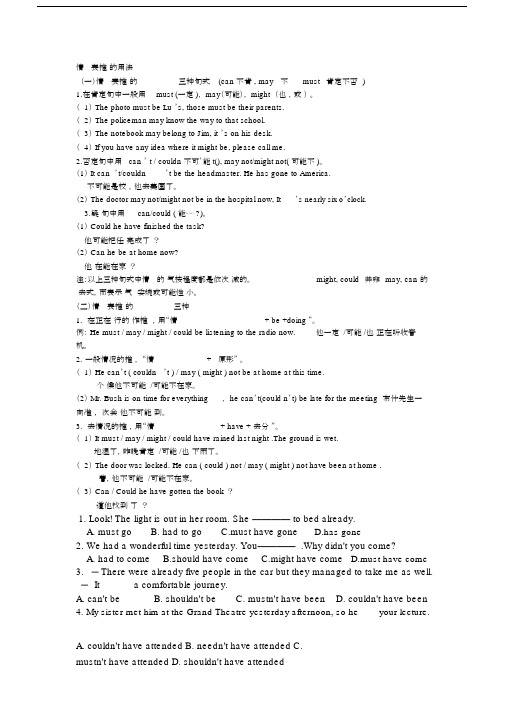
情表推的用法(一)情表推的三种句式(can 不肯 , may不must肯定不否)1.在肯定句中一般用must (一定 ), may(可能), might (也,或)。
(1) The photo must be Lu ’s, those must be their parents.(2) The policeman may know the way to that school.(3) The notebook may belong to Jim, it ’s on his desk.(4) If you have any idea where it might be, please call me.2.否定句中用can ’ t / couldn 不可’能t(), may not/might not( 可能不 )。
(1) It can ’t/couldn’t be the headmaster. He has gone to America.不可能是校,他去美国了。
(2) The doctor may not/might not be in the hospital now, It’s nearly six o’clock.3.疑句中用can/could ( 能⋯⋯ ?)。
(1) Could he have finished the task?他可能把任完成了?(2) Can he be at home now?他在能在家?注:以上三种句式中情的气按程度都是依次减的。
might, could并非may, can的去式,而表示气委婉或可能性小。
(二)情表推的三种1.在正在行的作推,用“情+ be +doing ”。
/可能 /也正在听收音例: He must / may / might / could be listening to the radio now.他一定机。
2.一般情况的推,“情+ 原形”。
情态动词表推测的讲解及练习题
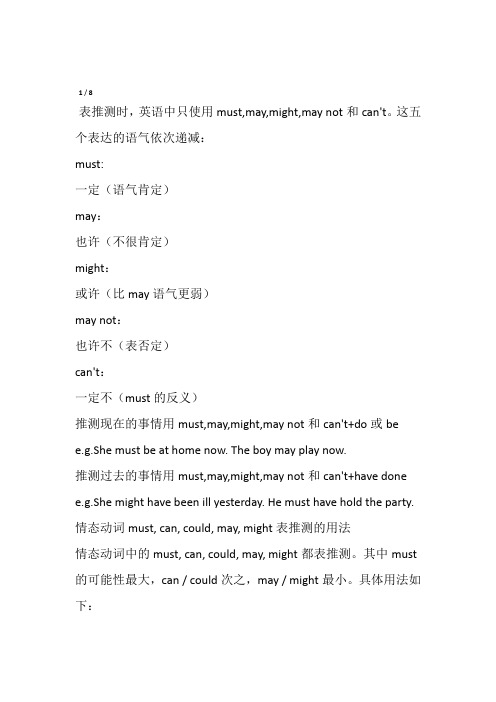
1 / 8表推测时,英语中只使用must,may,might,may not和can't。
这五个表达的语气依次递减:must:一定(语气肯定)may:也许(不很肯定)might:或许(比may语气更弱)may not:也许不(表否定)can't:一定不(must的反义)推测现在的事情用must,may,might,may not和can't+do或be e.g.She must be at home now. The boy may play now.推测过去的事情用must,may,might,may not和can't+have done e.g.She might have been ill yesterday. He must have hold the party. 情态动词must, can, could, may, might表推测的用法情态动词中的must, can, could, may, might都表推测。
其中must 的可能性最大,can / could次之,may / might最小。
具体用法如下:2 / 81.must的用法(1)表示推测“可能性”时,意思是“一定、准是”,语气较肯定,较有把握。
He must be American. = It is certain that he is American.他准是个美国人。
(2)must表推测只能用于肯定句。
如果要表示“一定不、肯定不”的意思时,应用can't,如询问某种可能时,应用can。
He must know my address.他肯定知道我的地址。
(一定)He can't know my address.他肯定不知道我的地址。
(一定不)Can he know my address?他知道我的地址吗?(询问可能性)(3)must表示推测时,可以推测现在/正在发生的动作/过去发生的动作。
情态动词表示推测的用法
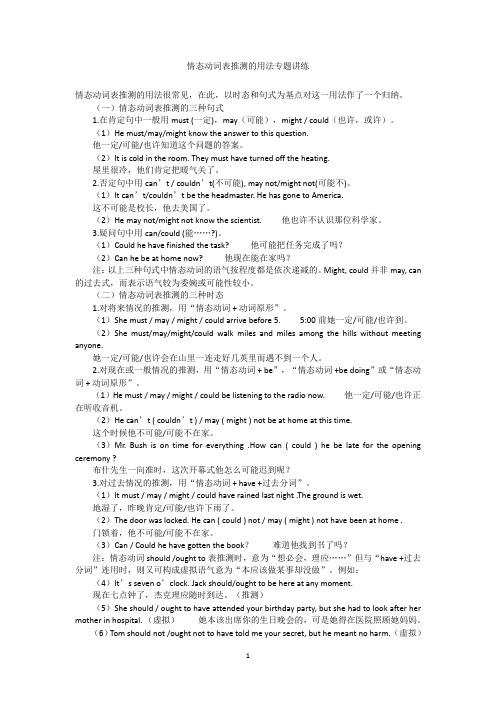
情态动词表推测的用法专题讲练情态动词表推测的用法很常见,在此,以时态和句式为基点对这一用法作了一个归纳。
(一)情态动词表推测的三种句式1.在肯定句中一般用must (一定),may(可能),might / could(也许,或许)。
(1)He must/may/might know the answer to this question.他一定/可能/也许知道这个问题的答案。
(2)It is cold in the room. They must have turned off the heating.屋里很冷,他们肯定把暖气关了。
2.否定句中用can’t / couldn’t(不可能), may not/might not(可能不)。
(1)It can’t/couldn’t be the headmaster. He has gone to America.这不可能是校长,他去美国了。
(2)He may not/might not know the scientist. 他也许不认识那位科学家。
3.疑问句中用can/could (能……?)。
(1)Could he have finished the task? 他可能把任务完成了吗?(2)Can he be at home now? 他现在能在家吗?注:以上三种句式中情态动词的语气按程度都是依次递减的。
Might, could并非may, can 的过去式,而表示语气较为委婉或可能性较小。
(二)情态动词表推测的三种时态1.对将来情况的推测,用“情态动词 + 动词原形”。
(1)She must / may / might / could arrive before 5. 5:00前她一定/可能/也许到。
(2)She must/may/might/could walk miles and miles among the hills without meeting anyone.她一定/可能/也许会在山里一连走好几英里而遇不到一个人。
(完整)情态动词表推测的讲解及练习题
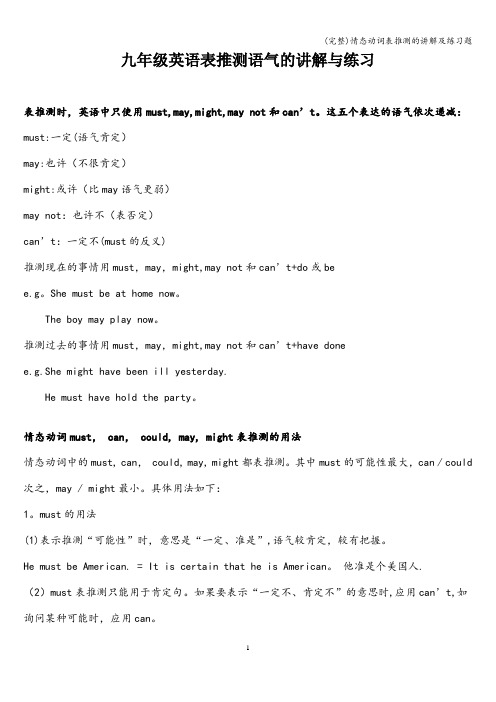
九年级英语表推测语气的讲解与练习表推测时,英语中只使用must,may,might,may not和can’t。
这五个表达的语气依次递减:must:一定(语气肯定)may:也许(不很肯定)might:或许(比may语气更弱)may not:也许不(表否定)can’t:一定不(must的反义)推测现在的事情用must,may,might,may not和can’t+do或bee.g。
She must be at home now。
The boy may play now。
推测过去的事情用must,may,might,may not和can’t+have donee.g.She might have been ill yesterday.He must have hold the party。
情态动词must, can, could, may, might表推测的用法情态动词中的must, can, could, may, might都表推测。
其中must的可能性最大,can / could 次之,may / might最小。
具体用法如下:1。
must的用法(1)表示推测“可能性”时,意思是“一定、准是”,语气较肯定,较有把握。
He must be American. = It is certain that he is American。
他准是个美国人.(2)must表推测只能用于肯定句。
如果要表示“一定不、肯定不”的意思时,应用can’t,如询问某种可能时,应用can。
He must know my address. 他肯定知道我的地址。
(一定)He can’t know my address。
他肯定不知道我的地址。
(一定不)Can he know my address?他知道我的地址吗?(询问可能性)(3)must表示推测时,可以推测现在/正在发生的动作/过去发生的动作。
He must have a car now。
初中英语-情态动词表示推测的用法及专项练习

情态动词must, can, could, may, might表推测的用法:1.用于肯定的推测:must > can > could > may > might1)其中must语气最强最肯定,只用于肯定句,意为“一定,准是,必然会”。
You haven’t eaten anything since this morning,you must be hungry.2) can次之一般表示理论上可能性,但实际未必会发生。
意为“可能”。
Even experienced teachers can make mistakes.3) could再次之,意为“可能”My book has disappeared. Who could have taken it?4) may / might语气最弱,表示无把握的推测,意为“可能,或许”。
(might比may 更加不肯定,更无把握)。
例如:He may/might be writing a letter now, but I’m not sure.2. 用于否定的推测can’t >couldn’t > may not > might not1)can’t用于否定推测,是语气最强的否定推测,意为“不可能,一定不(是)”。
He can’t her here because she is in hospital.2)couldn’t 比can’t 语气弱,表示某事不可能真实,但自己也不是很肯定。
It couldn’t possibly be Tom. He should be at school now.3). may not/ might not表示否定推测时,表示(无把握的)否定推测,意为“可能/或许不”。
例如:It’ still early. He may/might not come back.3.用于疑问句的推测,一般只用can/couldWho can it be at the door? Can it be Tom?情态动词中的must, can, could, may, might都表推测。
情态动词表推测的讲解及练习题
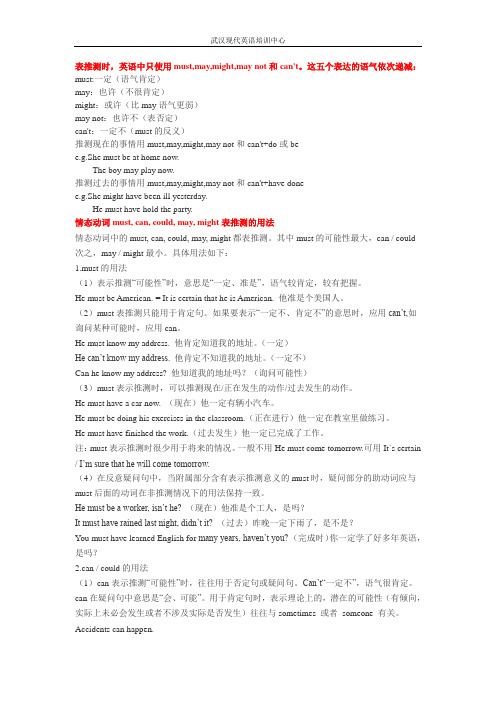
表推测时,英语中只使用must,may,might,may not和can't。
这五个表达的语气依次递减:must:一定(语气肯定)may:也许(不很肯定)might:或许(比may语气更弱)may not:也许不(表否定)can't:一定不(must的反义)推测现在的事情用must,may,might,may not和can't+do或bee.g.She must be at home now.The boy may play now.推测过去的事情用must,may,might,may not和can't+have donee.g.She might have been ill yesterday.He must have hold the party.情态动词must, can, could, may, might表推测的用法情态动词中的must, can, could, may, might都表推测。
其中must的可能性最大,can / could次之,may / might最小。
具体用法如下:1.must的用法(1)表示推测“可能性”时,意思是“一定、准是”,语气较肯定,较有把握。
He must be American. = It is certain that he is American. 他准是个美国人。
(2)must表推测只能用于肯定句。
如果要表示“一定不、肯定不”的意思时,应用can’t,如询问某种可能时,应用can。
He must know my address. 他肯定知道我的地址。
(一定)He can’t know my address. 他肯定不知道我的地址。
(一定不)Can he know my address? 他知道我的地址吗?(询问可能性)(3)must表示推测时,可以推测现在/正在发生的动作/过去发生的动作。
He must have a car now. (现在)他一定有辆小汽车。
初中情态动词表的推测用法猜测及练习(经典)

初中情态动词表的推测用法猜测及练习(经典)在初中语法研究中,情态动词是一个重要的部分。
情态动词除了表示能力、可能性、允许性等含义外,还可用于表达推测。
本篇文档将介绍初中情态动词表的推测用法,并提供一些练。
情态动词表的推测用法猜测情态动词用于推测时,常常表示根据已有的信息或证据得出的合理猜测或推断。
以下是一些常见的情态动词及其推测用法:1. can: 表示推测,例如:"He can be at home."(他可能在家。
)can: 表示推测,例如:"He can be at home."(他可能在家。
)2. could: 表示推测,通常比can稍微更不确定,例如:"She could be busy."(她可能忙。
)could: 表示推测,通常比can稍微更不确定,例如:"She could be busy."(她可能忙。
)3. may/might: 表示推测,表示某种可能性,例如:"It may rain tomorrow."(明天可能会下雨。
)may/might: 表示推测,表示某种可能性,例如:"It may rain tomorrow."(明天可能会下雨。
)4. must: 表示根据已有的证据或情况必然发生的推测,例如:"He must be tired."(他一定很累。
)must: 表示根据已有的证据或情况必然发生的推测,例如:"He must be tired."(他一定很累。
)5. should: 表示合理的推测或建议,例如:"They should be here soon."(他们应该很快就到了。
)should: 表示合理的推测或建议,例如:"They should be here soon."(他们应该很快就到了。
(完整word版)情态动词表推测用法总结和专项练习,文档.doc
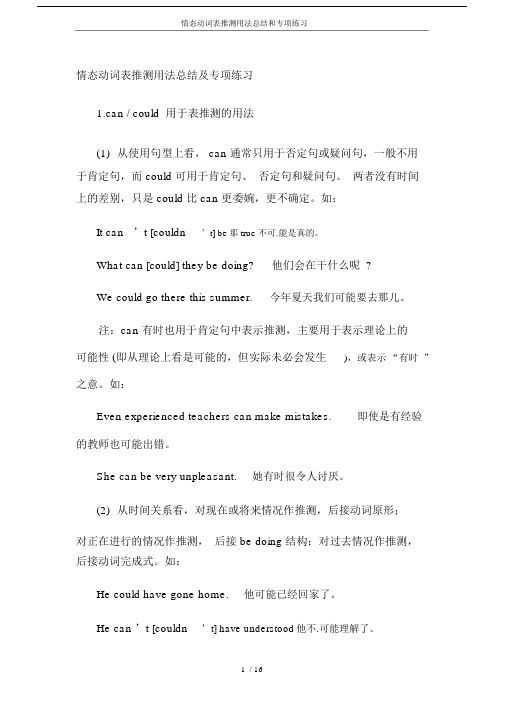
情态动词表推测用法总结和专项练习情态动词表推测用法总结及专项练习1.can / could 用于表推测的用法(1)从使用句型上看, can 通常只用于否定句或疑问句,一般不用于肯定句,而 could 可用于肯定句、否定句和疑问句。
两者没有时间上的差别,只是 could 比 can 更委婉,更不确定。
如:It can’t [couldn’t] be那true不可.能是真的。
What can [could] they be doing?他们会在干什么呢?We could go there this summer.今年夏天我们可能要去那儿。
注:can 有时也用于肯定句中表示推测,主要用于表示理论上的可能性 (即从理论上看是可能的,但实际未必会发生),或表示“有时”之意。
如:Even experienced teachers can make mistakes.即使是有经验的教师也可能出错。
She can be very unpleasant.她有时很令人讨厌。
(2)从时间关系看,对现在或将来情况作推测,后接动词原形;对正在进行的情况作推测,后接 be doing 结构;对过去情况作推测,后接动词完成式。
如:He could have gone home.他可能已经回家了。
He can ’t [couldn’t] have understood他不.可能理解了。
Why does he know this? Can [Could] someone have told him about it?他怎么知道?会是哪个人告诉他了吗?(3)“could+完成式”除表示对过去的推测外,还有以下重要用法:① 表示过去没有实现的可能性,常译为“本来可以”。
如:I could have lent you the money.Why didn’t you ask me?我本来可以借这笔钱给你的。
你为什么不向我提出?② 用来委婉地责备某人过去应该做某事而没有去做,常译为“本来应该”。
情态动词表推测的讲解及练习题
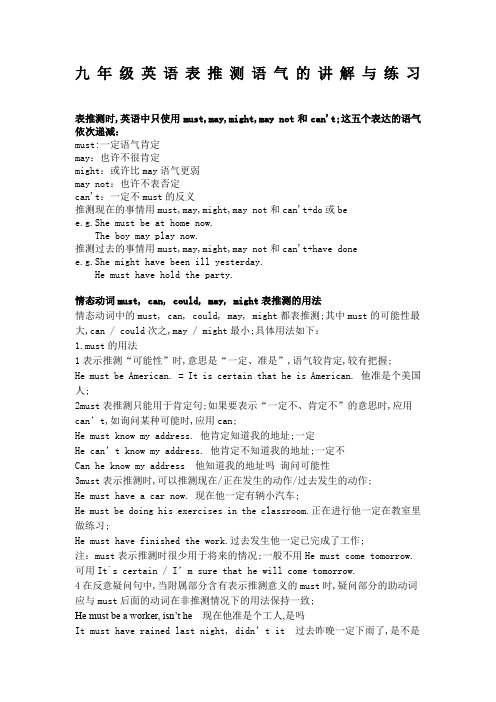
九年级英语表推测语气的讲解与练习表推测时,英语中只使用must,may,might,may not和can't;这五个表达的语气依次递减:must:一定语气肯定may:也许不很肯定might:或许比may语气更弱may not:也许不表否定can't:一定不must的反义推测现在的事情用must,may,might,may not和can't+do或bee.g.She must be at home now.The boy may play now.推测过去的事情用must,may,might,may not和can't+have donee.g.She might have been ill yesterday.He must have hold the party.情态动词must, can, could, may, might表推测的用法情态动词中的must, can, could, may, might都表推测;其中must的可能性最大,can / could次之,may / might最小;具体用法如下:1.must的用法1表示推测“可能性”时,意思是“一定、准是”,语气较肯定,较有把握;He must be American. = It is certain that he is American. 他准是个美国人;2must表推测只能用于肯定句;如果要表示“一定不、肯定不”的意思时,应用can’t,如询问某种可能时,应用can;He must know my address. 他肯定知道我的地址;一定He can’t know my address. 他肯定不知道我的地址;一定不Can he know my address 他知道我的地址吗询问可能性3must表示推测时,可以推测现在/正在发生的动作/过去发生的动作;He must have a car now. 现在他一定有辆小汽车;He must be doing his exercises in the classroom.正在进行他一定在教室里做练习;He must have finished the work.过去发生他一定已完成了工作;注:must表示推测时很少用于将来的情况;一般不用He must come tomorrow.可用It`s certai n / I’m sure that he will come tomorrow.4在反意疑问句中,当附属部分含有表示推测意义的must时,疑问部分的助动词应与must后面的动词在非推测情况下的用法保持一致;He must be a worker, isn’t he 现在他准是个工人,是吗It must have rained last night, didn’t it 过去昨晚一定下雨了,是不是You must have learned English for many years, ha ven’t you 完成时你一定学了好多年英语,是吗2.can / could的用法1can表示推测“可能性”时,往往用于否定句或疑问句;Can’t“一定不”,语气很肯定;can在疑问句中意思是“会、可能”;用于肯定句时,表示理论上的,潜在的可能性有倾向,实际上未必会发生或者不涉及实际是否发生往往与sometimes 或者 someone 有关;Accidents can happen.He can’t be at home. = It is impossible that he is at home. 他一定不在家;2can /can’t后可接进行时/完成时,表示对现在发生的动作或过去发生的动作进行推测;They can’t be reading in the library. 他们一定不在图书馆读书;He can’t have gone to Shanghai for I saw him a minute ago.他不可能去了上海,我刚才还看见他;It’s so late. Where can she have gone 天晚了,她可能去哪儿了呢3在反意疑问句中,当陈述部分含有表示推测意义的can’t时,疑问部分的助动词应与can’t后面的动词在非推测情况下的用法保持一致.He can’t be a teacher, is he 他不是教师,是吗She can’t have finished her homework, has she 她一定没有完成家庭作业,是不是could可用于表示某事有可能发生表示可能性不大的推测;意思相当于may/mightDon’t eat it. It could be poisonous. 不要吃它,可能有毒;The plane could be delayed by fog. 飞机可能会因为雾晚点;5could还可以用于表示客气、委婉、礼貌的请求语气;Excuse me, could you tell me the way to the bus stationCould you help me6couldn’t表示否定推测,表示某事不可能真实,或由于特定事实或环境某事肯定不会发生;It couldn’t possibly be poison. 这不可能是毒药;表示对过去发生的事推测,常常和have done 连用He was not at home last night . He could/ might have gone to movies.I didn't see her at the meeting yesterday; she couldn't have spoken at the meeting.3. may和might的用法1may, might表示推测“可能性”时,意思是“可能”、“也许”,语气没有 must 肯定;He may / might be American. = It is possible that he is American.他可能是个美国人;注:might不表示过去时态,只是语气上比may更委婉,表示的可能性更小;2may, might表推测时,可以用于否定句,意思是“可能不、也许不”,但不用于疑问句;He may / might not be at home. 他也许不在家;3may, might可以推测现在正在发生的动作或过去发生的动作;He may / might be sleeping now. 现在他可能正在睡觉;The boy may / might not be watching TV at home. 现在这个男孩可能没在家看电视These students may / might have seen the film before.过去这些学生以前可能看过这部电影;4may, might还可以推测将来的情况;I think we should take raincoat with us, it may rain.我想我们应该带上雨衣,可能要下雨了;She might not come this afternoon. 她今天下午可能不来能用于表推测的情态动词:must, can, could, will, would, may, might, should, ought to1.在肯定句中一般用must 一定,may可能,might / could也许,或许;1He must/may/might know the answer to this question他一定/可能/也许知道这个问题的答案;2It is cold in the room. They must have turned off the heating.屋里很冷,他们肯定把暖气关了;2.否定句中用can’t / couldn’t不可能, may not/might not可能不;1It can’t/couldn’t be the headmaster. He has gone to America.这不可能是校长,他去美国了;2He may not/might not know the scientist.他也许不认识那位科学家;3.疑问句中用can/could 能…… ;1Could he have finished the task 他可能把任务完成了吗2Can he be at home now 他现在能在家吗注:以上三种句式中情态动词的语气按程度都是依次递减的;Might, could并非may, can的过去式,而表示语气较为委婉或可能性较小;1.对将来情况的推测,1She must / may / might / could arrive before 5. 5:00前她一定/可能/也许到;2She must/may/might/could walk miles and miles among the hills without meeting anyone. 她一定/可能/也许会在山里一连走好几英里而遇不到一个人;2.对现在或一般情况的推测,1He must / may / might / could be listening to the radio now.他一定/可能/也许正在听收音机;2He can’t couldn’t / may might not be at home at this time.这个时候他不可能/可能不在家;3Mr. Bush is on time for everything .How can could he be late for the opening ceremony 布什先生一向准时,这次开幕式他怎么可能迟到呢3.对过去情况的推测,1It must / may / might / could have rained last night .The ground is wet.地湿了,昨晚肯定/可能/也许下雨了;2The door was locked. He can could not / may might not have been at home .门锁着,他不可能/可能不在家;3Can / Could he have gotten the book 难道他找到书了吗注:情态动词 should /ought to表推测时,意为“想必会,理应……”但与“have +过去分词”连用时,则又可构成虚拟语气意为“本应该做某事却没做”;例如:4It’s seven o’clock. Jack should/ought to be here at any moment.现在七点钟了,杰克理应随时到达;推测5She should / ought to have attended your birthday party, but she had to look after her mother in hospital. 虚拟她本该出席你的生日晚会的,可是她得在医院照顾她妈妈;6Tom should not /ought not to have told me your secret, but he meant no harm. 虚拟汤姆本不该告诉我你的秘密,可是他并无恶意;补充强调:推测的句型特点对某一次的推测句型有两部分:语气和时态1语气部分:以下情态动词语气由强至弱肯定句:must、may、might=could否定句:can’t=couldn’t、mayn’t、mightn’t疑问句:can、could语气更加委婉不确定2时态部分:be have donebe doing语气部分写在前时态部分写在后,组合在一起就是推测三几组表推测的情态动词用法“情态动词+完成时”是历年高考的热点,在做此类练习时,既需要掌握这一结构的基本用法,又应该仔细体会题干所提供的语言信息,准确理解语言环境和说话人的含义,尤其要注意题干中时态给予的暗示;1.must have done表示对已经发生的事情的推测,一种肯定的推测;这种结构一般只用于肯定句,其否定形式是表示“不可能,肯定不会”;例如:He didn’t hear the phone . He must have been asleep.他没有听到电话响,他肯定是已经睡着了;He must have been to Shanghai. 他一定去过上海;They can’t have gone out , because the light is on . 他们不可能出去,因为灯亮着;2. cancouldhave done表示对过去的时间内可能发生的事情的猜测,can have done 一般只用于否定句和疑问句;could have done 还可以用于肯定句,常用来表示本来可能完成而实际未完成的动作;例如:He can’t have finished the work so soon. 这项工作他不可能完成得这样快;We could have walked to the station , it was so near . 我们本来是可以走到车站去的,路很近;3. maymighthave done1表示对已经发生的事情的不太肯定的推测,意为“可能已经,或许已经”;2虚拟用法表示本可以做,但却没做表示很委屈地责备If we had taken the other road , we might have arrived earlier.如果我们选择另一条路,我们可能会到得早一些;He might have given you more help, he was very busy.他本来是可以给你更多帮助的,尽管他很忙;4. needn’t have done 指实际上做了本来不必要做的事,意为“本来不必”;例如:There was plenty of time . She needn’t have hurried.时间很充裕,她本不必匆忙;You needn’t have told him the news.他本来不必把这个消息告诉他;5. should ought to have done指本该做而实际未做的事,意为“本来应该”;其否定式shouldn’toughtn’thave done 则表示某种行为不该发生但却发生了;例如:You should have started earlier , but you didn’t.你本应该早一点出发,但是你没有;You ought to have helped him but you didn’t . 你本应该帮助他;We shouldn’t have waited for her because she never came.我们本不应该等她,因为她根本不会来;6.Would have done 本想做却没做wouldn’t have done 本不想做却做了I would have helped you, but I was too busy.我本想帮你,但我太忙了;小试牛刀一、单项选择1 John___ come to see us tonight, but he isn't very sure yet.A. mayB. needC. can’tD. must2 John isn’t in the clas sroom. He play soccer on the playground with Bob.A. canB. mustC. shouldD. can’t3 That _______not be her husband . She is still single.A. mayB.canC. couldD. might4 You___ go and see a doctor at once because you got a fever.A. canB. mustC. dareD. would5 -Can you speak Japanese -No, I____.A. mustn'tB. can'tC. needn'tD. may not6 -He___ be in the classroom, I think.-No, he ___ be in the classroom. I saw him go home a minute ago. A.can; may not B. must; may not C. may; can't D. may; mustn't7 -Is Lena swimming in the pool-No, she swim. She is terrified of water.A. may notB. must notC. can'tD. needn't8 He isn't at school. I think he ___ be ill.A. canB. shallC. mustD. might9 -What do you think “upset” means- I’m not sure. It mean “sad”.A.mayB. mustC. canD. should10 The children___ play football on the road.A. can'tB. canC. mustn'tD. must11.The road is wet . It ______last night.A. must rainB. must have rainedC. could have rainedD. can have rained12 .He ______you more help , even though he was busy .A might have givenB might not giveC may not have givenD may give练一练1. Look The light is out in her room. She ———— to bed already.A. must goB. had to goC.must have goneD.has gone2. We had a wonderful time yesterday. You ———— .Why didn't you comeA. had to comeB.should have comeC.might have comeD.must have come3. ─There were already five people in the car but they managed to take me as well.─ It______ a comfortable journey.A. can't beB. shouldn't beC. mustn't have beenD. couldn't have been4. My sister met him at the Grand Theatre yesterday afternoon, so he ___ your lecture.A. couldn't have attendedB. needn't have attendedC. mustn't have attendedD. shouldn't have attended5. I was really anxious about you. You _____ home without a word.A. mustn't leaveB. Shouldn't have leftC. Couldn't have leftD. needn't leave6. Oh, I’m not feeling well in the stomach,I_____ so much fried chicken just now.A. shouldn’t cutB. mustn’t have eatenC. should n’t have eatenD. mustn’t eat7. Mr.White _____ at 8:30 for the meeting, but he didn’t’ show up.A. should have arrivedB. should arriveC. should have had arrivedD. should be arriving8. You ______ be tired - you've only been working for an hour.A. must notB. won' tC. can' tD. may not9. - Isn' t that Ann's husband over there- No, it _______ be him -I'm sure he doesn't wear glasses.A. can'tB. must notC. won'tD. may not10. There ____ be any difficulty about passing the road test since you have practised a lot in the driving school.A . mustn’t B. shan’t C. shouldn’tD.needn’t11. I was on the highway when this car went past followed by a police car. They ______ at lease 150 km an hour.A. should have been doingB. must have been doingC. could have doneD. would have done12. He _____ have completed his work; otherwise, he wouldn’t be enjoying himself by the seaside.A. shouldB. mustC. wouldn’tD. can’t13. ---- The woman biologist stayed in Africa studying wild animals for 13 years before she returned.---- Oh, dear She _______ a lot of difficultiesA. may go throughB. might go throughC. ought to have gone throughD. must have gone through14. This cake is very sweet. You __________ a lot of sugar in it. A.should put B.could have put C.might put D.must have put15. —Catherine, I have cleaned the room for you.—Thanks. You it. I could manage it myself.A.needn’t do B.needn’t have doneC.mustn’t do D.shouldn’t have done16.—Tom is never late for work. Why is he absent today—Something ________ to him.A.must happen B.should have happenedC.could have happened D.must have happened情态动词+have done 结构1.---You didn’t wait for Mr. Smith last night, did you---No, but we ______. He didn’t return home at all.A. couldn’t have waitedB. needn’t haveC. didn’t need toD. should wait2.Harry ______ have won the Physics competition easily yesterday, but he gave up.A. couldB. mightC. shouldD. must3.---May I speak to your manager Mr. Smith at six o’clock tonight ”---“I’m sorry, Mr. Smith to a conference before then.”A. will have goneB. had goneC. would have goneD. has gone4.---Tom took away our teacher’s cell phone without being permitted. --- Really I can’t imagine that he _______ have done such a thing.A. mustB. mayC. canD. should6.The weather turned out to be fine yesterday. I_________ the trouble to carry my umbrella with me .A. should have takenB. could have takenC. needn't have takenD. mustn't have taken7.He paid for a seat, when he ______ have entered free.A. couldB. wouldC. mustD. need8.I didn’t see her in the meeting room this morning. She at the meeting .A. mustn’t have spokenB. mightn’t have spokenC. can’t have spokenD. shouldn’t have spoken9.--- Hi, is that Peter Brown---Sorry. You ______ the wrong number .A. must dialB. must have dialedC. should dialD. should have dialed 10.I was on the highway when this car went past followed by a police car . They ______ at least 150 kilometers an hour .A. should have been doingB. must have been doingC. could have doneD. would have done11. He is not poor. You ____ have lent him the money.A. can’tB. needn’tC. couldn’tD. mustn’t12. There was plenty of time. You ___ have hurried.A. won’tB. mustn’tC. needn’tD. couldn’t13.He paid for a seat, when he ___ have entered free. 05 山东A. couldB. wouldC. mustD. need--- On, it ___ my brother, Peter.A. must beB. must have beenC. can have beenD. might be14. I ____ here in time, but I met an old friend of mine. I stopped and talked with him for some time.A. shouldn’t have comeB. must have comeC. needn’t have comeD. could have come15. They ____ have finished the work yesterday, but it was raining hard.A. mustB. couldC. shouldD. might16.Something ___ to him. 05江西 22题A. must happenB. should have happenedC. could have happenedD. must have happened。
推测的情态动词总结及练习含答案高中英语北京海淀
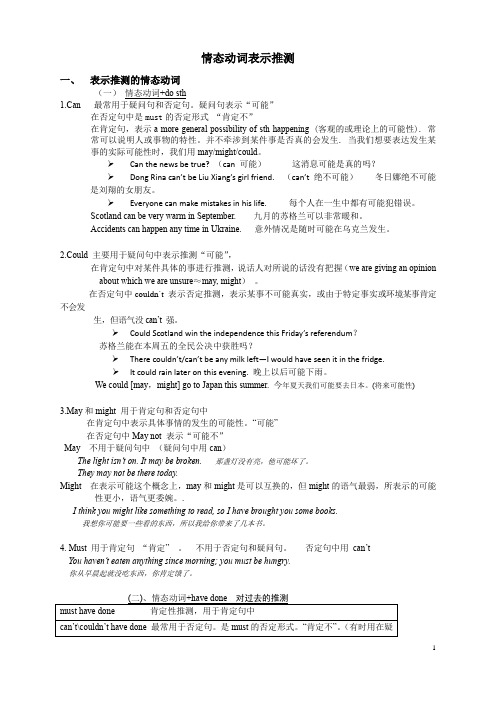
情态动词表示推测一、表示推测的情态动词(一)情态动词+do sth1.Can 最常用于疑问句和否定句。
疑问句表示“可能”在否定句中是must的否定形式“肯定不”在肯定句,表示a more general possibility of sth happening (客观的或理论上的可能性). 常常可以说明人或事物的特性。
并不牵涉到某件事是否真的会发生. 当我们想要表达发生某事的实际可能性时,我们用may/might/could。
➢Can the news be true? (can 可能)这消息可能是真的吗?➢Dong Rina can’t be Liu Xiang’s girl friend. (can’t 绝不可能)冬日娜绝不可能是刘翔的女朋友。
➢Everyone can make mistakes in his life. 每个人在一生中都有可能犯错误。
Scotland can be very warm in September. 九月的苏格兰可以非常暖和。
Accidents can happen any time in Ukraine. 意外情况是随时可能在乌克兰发生。
2.Could 主要用于疑问句中表示推测“可能”,在肯定句中对某件具体的事进行推测,说话人对所说的话没有把握(we are giving an opinionabout which we are unsure≈may, might)。
在否定句中couldn`t 表示否定推测,表示某事不可能真实,或由于特定事实或环境某事肯定不会发生,但语气没can’t 强。
➢Could Scotland win the independence this Friday’s referendum?苏格兰能在本周五的全民公决中获胜吗?➢There couldn’t/can’t be any milk left—I would have seen it in the fridge.➢It could rain later on this evening. 晚上以后可能下雨。
表推测的情态动词用法小结含练习与答案

表推测的情态动词用法小结英语中有不少情态动词都可以表示推测,其语气有强有弱,表示的可能性有大有小,现将它们的用法归纳如下:1. 接近100%的可能这当然只有must才具有这么高的可能性,它的意思是“一定”“肯定”,所作出的推测几乎接近事实。
如:That hat must be Tom’s.那帽子一定是汤姆的。
He must be coming by bus. 他一定是乘公共汽车来。
2. 很有可能表示可能性较大的情态动词主要有may, should, ought to,它们大致相当于汉语的“可能”“应该”“按理会”。
如:She should [ought to] be here soon. 她应该很快就到。
We may be buying a new house. 我们可能要买一座新房子。
3. 一般性的可能在所有表示推测的情态动词中,might和could所表示的可能性最小,由于它们的语气较委婉,较不确定,所以往往相当于汉语的“可能”“也许”“说不定”等。
如:He might be waiting for you. 他可能在等你。
We could all be millionaires one day. 我们有一天可能都成为百万富翁。
4. 理论上的可能性表示理论上的可能通常是用can,且可以用于肯定句中。
如:Food poisoning can cause death. 食物中毒可导致死亡。
This kind of thing can happen every now and then. 这种事情是随时可能发生的。
所谓理论上的可能性,就是指仅从理论上去考虑其可能性,至于实际情况如何,则不作考虑,比如说“食物中毒可导致死亡”,这只是理论上的一种推断,至于某人某次食物中毒了,他是否会死亡,则不在考虑之列,所以说,这种推测是非常“宏观”的!5. 表示对过去情况作推测如果表示对已经发生的情况作推测,不能用“情态动词+动词原形”,也不能用“情态动词的过去式+动词原形”,而是要使用“情态动词+动词完成式”。
初中情态动词表的用法推测及练习(经典)

初中情态动词表的用法推测及练习(经典)本文档旨在提供初中学生关于情态动词用法推测及练方面的指导。
下方是一份经典的初中情态动词表,供学生参考和练。
用法推测Can / Could- 表示能力或可能性:He [can/could] swim very fast. (他会游泳很快。
)- 表示请求或允许:[Can/Could] you help me with the homework? (你能帮我做作业吗?)May / Might- 表示可能性或允许:We [may/might] go to the ___(我们明天可能去公园。
)- 表示推测或建议:He [may/might] be late for the meeting. (他可能会迟到开会。
)___- 表示将来的行为:I [shall/should] ___我这个周末会去看望我祖父母。
)- 表示义务或建议:You [should] study hard for the exam. (你应该为考试而努力研究。
)Will / Would- 表示将来的行动或意愿:He [will/would] buy a new car. (他想买一辆新车。
)- 表示请求或邀请:[Will/Would] you please pass me the salt? (请你把盐递给我好吗?)Must- 表示必须性或推测:I [must] ___ before going out. (我必须在出门之前完成作业。
)- 表示肯定的推测:He [must] be tired after running for so long. (他跑了这么久肯定累了。
)___- 表示应该或建议:You [ought to] apologize to your friend. (你应该向你的朋友道歉。
)练根据上述情态动词的用法推测,完成以下句子:1. I __________ swim when I was five years old. (我五岁的时候能游泳。
情态动词表推测用法总结及练习
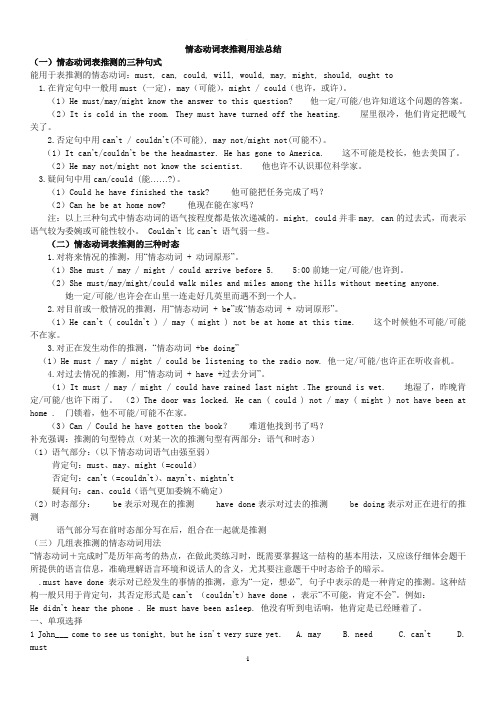
情态动词表推测用法总结(一)情态动词表推测的三种句式能用于表推测的情态动词:must, can, could, will, would, may, might, should, ought to1.在肯定句中一般用must (一定),may(可能),might / could(也许,或许)。
(1)He must/may/might know the answer to this question? 他一定/可能/也许知道这个问题的答案。
(2)It is cold in the room. They must have turned off the heating. 屋里很冷,他们肯定把暖气关了。
2.否定句中用can’t / couldn’t(不可能), may not/might not(可能不)。
(1)It can’t/couldn’t be the headmaster. He has gone to America. 这不可能是校长,他去美国了。
(2)He may not/might not know the scientist. 他也许不认识那位科学家。
3.疑问句中用can/could (能……?)。
(1)Could he have finished the task? 他可能把任务完成了吗?(2)Can he be at home now? 他现在能在家吗?注:以上三种句式中情态动词的语气按程度都是依次递减的。
might, could并非may, can的过去式,而表示语气较为委婉或可能性较小。
Couldn’t 比can’t 语气弱一些。
(二)情态动词表推测的三种时态1.对将来情况的推测,用“情态动词 + 动词原形”。
(1)She must / may / might / could arrive before 5. 5:00前她一定/可能/也许到。
(2)She must/may/might/could walk miles and miles among the hills without meeting anyone.她一定/可能/也许会在山里一连走好几英里而遇不到一个人。
情态动词表推测的讲解及练习题
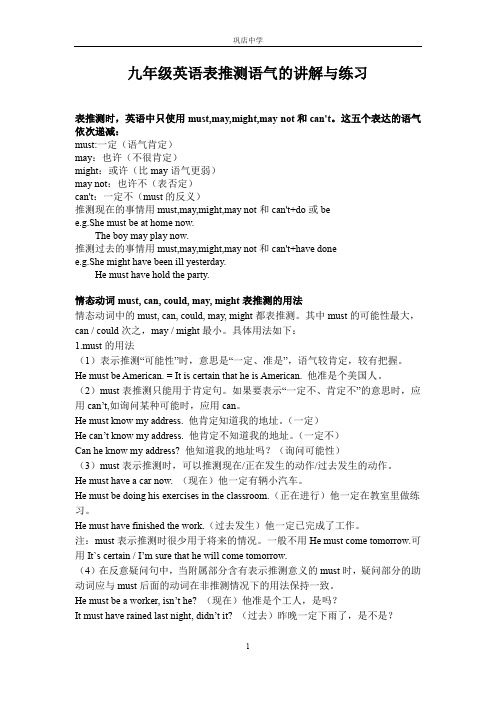
九年级英语表推测语气的讲解与练习表推测时,英语中只使用must,may,might,may not和can't。
这五个表达的语气依次递减:must:一定(语气肯定)may:也许(不很肯定)might:或许(比may语气更弱)may not:也许不(表否定)can't:一定不(must的反义)推测现在的事情用must,may,might,may not和can't+do或bee.g.She must be at home now.The boy may play now.推测过去的事情用must,may,might,may not和can't+have donee.g.She might have been ill yesterday.He must have hold the party.情态动词must, can, could, may, might表推测的用法情态动词中的must, can, could, may, might都表推测。
其中must的可能性最大,can / could次之,may / might最小。
具体用法如下:1.must的用法(1)表示推测“可能性”时,意思是“一定、准是”,语气较肯定,较有把握。
He must be American. = It is certain that he is American. 他准是个美国人。
(2)must表推测只能用于肯定句。
如果要表示“一定不、肯定不”的意思时,应用can’t,如询问某种可能时,应用can。
He must know my address. 他肯定知道我的地址。
(一定)He can’t know my address. 他肯定不知道我的地址。
(一定不)Can he know my address? 他知道我的地址吗?(询问可能性)(3)must表示推测时,可以推测现在/正在发生的动作/过去发生的动作。
情态动词表推测的讲解及练习题

九年级英语表推测语气的讲解与练习表推测时,英语中只使用must,may,might,may not和can't。
这五个表达的语气依次递减:must:一定(语气肯定)may:也许(不很肯定)might:或许(比may语气更弱)may not:也许不(表否定)can't:一定不(must的反义)推测现在的事情用must,may,might,may not和can't+do或bee.g.She must be at home now.The boy may play now.推测过去的事情用must,may,might,may not和can't+have donee.g.She might have been ill yesterday.He must have hold the party.情态动词must, can, could, may, might表推测的用法情态动词中的must, can, could, may, might都表推测。
其中must的可能性最大,can / could次之,may / might最小。
具体用法如下:1.must的用法(1)表示推测“可能性”时,意思是“一定、准是”,语气较肯定,较有把握。
He must be American. = It is certain that he is American. 他准是个美国人。
(2)must表推测只能用于肯定句。
如果要表示“一定不、肯定不”的意思时,应用can’t,如询问某种可能时,应用can。
He must know my address. 他肯定知道我的地址。
(一定)He can’t know my address. 他肯定不知道我的地址。
(一定不)Can he know my address? 他知道我的地址吗?(询问可能性)(3)must表示推测时,可以推测现在/正在发生的动作/过去发生的动作。
- 1、下载文档前请自行甄别文档内容的完整性,平台不提供额外的编辑、内容补充、找答案等附加服务。
- 2、"仅部分预览"的文档,不可在线预览部分如存在完整性等问题,可反馈申请退款(可完整预览的文档不适用该条件!)。
- 3、如文档侵犯您的权益,请联系客服反馈,我们会尽快为您处理(人工客服工作时间:9:00-18:30)。
情态动词表推测用法总结及专项练习1.can / could用于表推测的用法(1) 从使用句型上看,can 通常只用于否定句或疑问句,一般不用于肯定句,而could 可用于肯定句、否定句和疑问句。
两者没有时间上的差别,只是could 比can 更委婉,更不确定。
如:It can’t [couldn’t] be true. 那不可能是真的。
What can [could] they be doing? 他们会在干什么呢?We could go there this summer. 今年夏天我们可能要去那儿。
注:can 有时也用于肯定句中表示推测,主要用于表示理论上的可能性(即从理论上看是可能的,但实际未必会发生),或表示“有时”之意。
如:Even experienced teachers can make mistakes. 即使是有经验的教师也可能出错。
She can be very unpleasant. 她有时很令人讨厌。
(2) 从时间关系看,对现在或将来情况作推测,后接动词原形;对正在进行的情况作推测,后接be doing 结构;对过去情况作推测,后接动词完成式。
如:He could have gone home. 他可能已经回家了。
He can’t [couldn’t] have understood. 他不可能理解了。
Why does he know this? Can [Could] someone have told him about it? 他怎么知道? 会是哪个人告诉他了吗?(3) “could+完成式”除表示对过去的推测外,还有以下重要用法:①表示过去没有实现的可能性,常译为“本来可以”。
如:I could have lent you the money.Why didn’t you ask me? 我本来可以借这笔钱给你的。
你为什么不向我提出?②用来委婉地责备某人过去应该做某事而没有去做,常译为“本来应该”。
如:You could have helped him. 你本来应该帮助他的。
③表示“差点儿就要”。
如:I could have died laughing. 我差点儿笑死了。
2. may / might用于表推测的用法表示推测,两者都可用,只是might 比may 语气更不确定,表示的可能性更小。
(1) 在句型使用方面:两者均可用于肯定句和否定句,但用于疑问句时,may通常不用于句首,但可用于疑问句的句中(如特殊疑问句等),而might尽管可以用于疑问句的句首,但不算普通,通常会改用其他句式(如用could等)。
如:He may [might] know the answer. 他可能知道答案。
He may [might] not believe you. 他可能不会相信你。
And who may [might] she be? 那么她会是哪一位呢?(2) 从时间关系看,对现在或将来情况作推测,后接动词原形;对正在进行的情况作推测,后接be doing 结构;对过去情况作推测,后接动词完成式。
如:He may [might] tell his wife. 他也许会告诉他妻子。
He may [might] be writing a letter. 他可能在写信。
She may [might] have read it in the papers. 她可能在报上已读到过此事。
(3)“might+完成式”除表示对过去的推测外,还有以下重要用法:①表示过去某事可能发生而实际上却并没发生。
如:It was really very dangerous. I might have killed myself. 那真的是太危险了,我差点没命了。
A lot of men died who might have been saved.很多人本来可以获救的却死了。
②表示委婉的批评或责备。
如:You might have made greater progress. 你的进步本来可更大一些的。
You might at least have answered my letter. 你至少可以回我一封信嘛。
3. must表示推测的用法must 表示很有把握的推测,其意为“一定会”“肯定会”,只用于肯定句,一般不用于否定句或疑问句。
表示对现在或未来的情况作推测,后接动词原形;表示对过去情况的推测,接动词完成式。
如:I must be the happiest woman on earth! 我一定是世界上最幸福的女人了。
No, he must be lying. 不,他一定在撒谎He must have mistaken my meaning. 他一定误会了我的意思。
4. should have done 的用法should have done只用于谈论过去情况,主要有两个用法:一是用于推测过去已经发生的情况,二是用于指本该发生而实际上未发生的情况。
如:You should have told me so before. 你早就应该告诉我。
He should have arrived by now. 此时他本该到了。
Look at the time! We should have been at the theatre ten minutes ago. 瞧都什么时候了! 十分钟前我们就该到戏院了。
5. need have done 的用法need have done结构主要用于否定句或疑问句,一般不用于肯定句。
用于否定句时,表示本来不必做某事,但实际上却做了;用于疑问句时,用于询问某一过去动作的必要性。
如:You needn’t have hurried. 你当时实在不必那么匆忙。
She needn’t have come in person — a letter would have been enough. 她本不必亲自来——写封信来就足够了。
Need you have paid so much? 你当时真须要付那么多钱吗?Need they have sold the farm? 他们那时非得把农场卖掉不可吗?历届NMET中表推测的情态动词的用法情态动词是中学英语学习中的一个重点和难点,也是高考的重点考察内容之一。
其中表示推测用法的情态动词在近几年的高考中更是屡见不鲜。
现结合近几年的高考题目,对表推测的情态动词的用法作一归纳,希望对各位考生会有所帮助:【考例】1. Naturally, after I told her what to do, my daughter _____ go and do the opposite!A. mayB. canC. mustD. should(2003年普通高等学校春季招生统一招生考试英语试题(安徽卷)) 【分析】Can,may,must都可用来表示”推测”,但侧重点各有不同:May常用来指”事实上的可能性”,而can则表示一种”理论上的可能性”例如:The railways may be improved.=It is possible that the railways will be improved.=Perhaps/Maybe/Possibly the railways will be improved.铁路可能会得到改进。
(意味着已有具体的改进计划或方案。
)The railways can be improved.=It is possible for the railways to be improved.铁路可以得到改进。
(意思是铁路还不完善,尚有问题存在。
)理论上的可能性(can)比事实上的可能性(may)更弱。
在一般的陈述句,can与sometimes几乎相同,表示一种偶然的可能性。
比如:Even expert drivers can make mistakes.甚至是很熟练的驾驶员也可能会犯错。
=Even expert drivers sometimes make mistakes.=It is possible for the expert drivers to make mistakes.因此,如果讲的是一种特殊情况,不是一般情况,就用may,试比较:Mr Reed looks pale.He may be ill.Mr Reed is in poor health.He can be ill at any time.Must指逻辑必然,作“想必”、“准是”、“一定”解,用来表示我们对某事有把握的推论或揣测。
(考虑到迹象如此,再无别的结论=It seems certain that….):They must be very tired now, for they have been working the whole morning.他们现在一定是非常累了,因为他们整个上午都在工作。
析:填 C.must。
意思是”不出所料,当我告诉女儿要做的事时,她准会去做相反的事。
”【考例】1、Mary ___ be in Paris.I saw her in town only a few minutes ago.(NMET1994)A.mustn’tB.shouldn’tC.can’tD.may not2、.--Is John coming by train? (NMET 2002 Tianjing )--He should,but he ___ not.He likes driving his car. A.must B.can C.need D.may【分析】May用于否定时,not不是否定may,而是否定句中的动词,这一点与can不同,试比较:He may not know the truth.他可能不知道事情的真相。
(=It is possible that he didn’t know the truth.)He cannot know the truth.他不可能知道事情的真相。
must表示推测的这种用法通常用在肯定句中,在疑问句中常用can(可能),在否定句中常用can’t(不可能,不会是),而不用mustn’t。
例如:--- Somebody is knocking at the door. Who can it be ? It must be Wang Hong.--- No, It can’t be Wang Hong, because she left for Shanghaithis morning.---有人在敲门。
会是谁呢?一定是王红。
---不,不会是王红,因为她今天早晨就动身去上海了。
